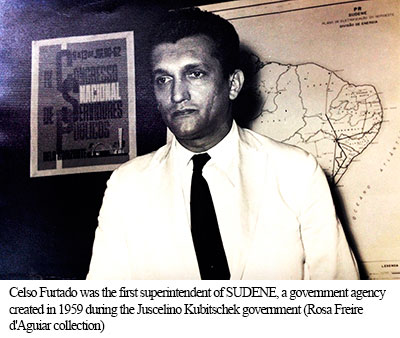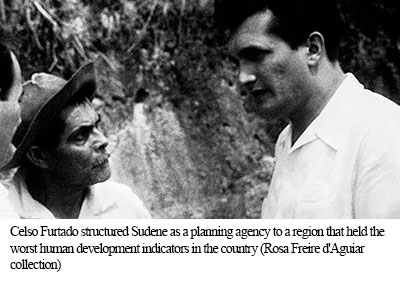
Celso Furtado, a native of Pombal, in the state of Paraiba, graduated in Law at the University of
Brazil, was a civil servant of the Administrative Department of the Public Service-DASP,
approved in a public tender in 1943, and served as an officer in the Brazilian Expeditionary
Force in Italy in 1945.
He entered the doctorate course in Economics, at the University of Sorbonne, Paris, in the year
of 1946. He defended the thesis “Brazilian Economy during the Colonial Period”. Back to Brazil,
he worked at the Getúlio Vargas Foundation (FGV). He married the Argentinian chemist Lúcia
Tosi, with whom he had two children, Mário and André.
In the United Nations Economic Commission for Latin America and the Caribbean (Cepal), he
took the direction of the Development Division, in the period from 1950 to 1958, when he was
invited to the board of directors of the Brazilian Development Bank (BNDE).
He was nominated by the president Juscelino Kubitscheck (1956-1961) to the Group of Studies
for the Development of Northeast (GTDN), where he elaborated the report “A Development
Policy to Northeast”, which originated the Council for the Development of Northeast (Codeno),
to which he was nominated to be executive secretary; Codeno later became Sudene, which was
instituted on December 15th, 1959, and Celso was its first superintendent. Sudene was the first
Brazilian institution that had planning as its guideline, with a Deliberative Council, the subject of
this site, whose composition was both political - with the participation of all governors from
Northeast and Minas Gerais state - and technical - the Executive Secretariat, to which the entire
organizational structure of SUDENE was subordinated.
Celso Furtado structured Sudene as a planning organization to a region that had (and still has)
the worst indexes of human development in Brazil, and he faced much resistance, though he
remained in his post for three presidential mandates; under his direction, he made the institution
renowned in the world.

During João Goulart’s government (1961-1964), Celso Furtado became the first holder of the
Ministry of Planning. He had all his political rights suspended under the Institutional Act nº 1,
starting a long exile, going, first, to live in Chile, the United States (where he teached at the
universities of Yale, Columbia, American University and Cambridge) and France, being the first
foreigner nominated to a French university, by a decree from De Gaulle (1959-1969), where
Celso Furtado remained for 20 years and married the Brazilian journalist Rosa Freire d’Aguiar.
With the amnesty, he was appointed Brazilian ambassador to the European Economic
Community (EEC) in 1985, and minister of Culture during José Sarney’s term (1985-1990).
Celso published more than thirty books, mostly on economical theory, history and politics,
translated to more than a dozen languages.
In 2000, as part of the celebration of his 80th birthday, the Brazilian Academy of Letters
organized the exhibition “Celso Furtado: Vocação Brasil” in Rio de Janeiro, and Sudene
organized the seminar “Celso Furtado, Sudene and the future of the Northeast”, where, besides
an allusive plaque to his 80 years and the 40 years of the institution, he was appointed
Researcher Emeritus of Fundação Joaquim Nabuco. On December 20th 2004, Celso Furtado
died after a cardiac arrest.
In this section of the website, the user will be able to read and listen to what Celso Furtado
thought about the Northeast, development, Brazil; all of it is registered in the collection that we
are now making available.